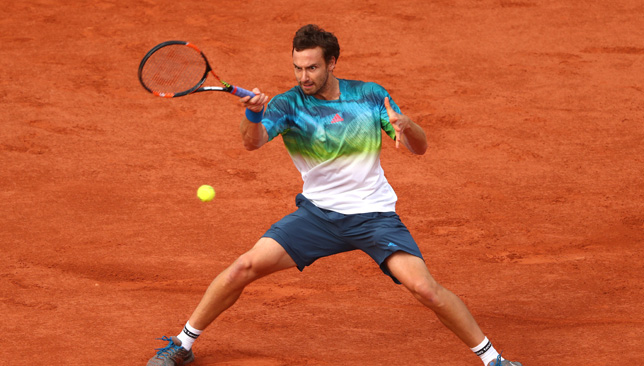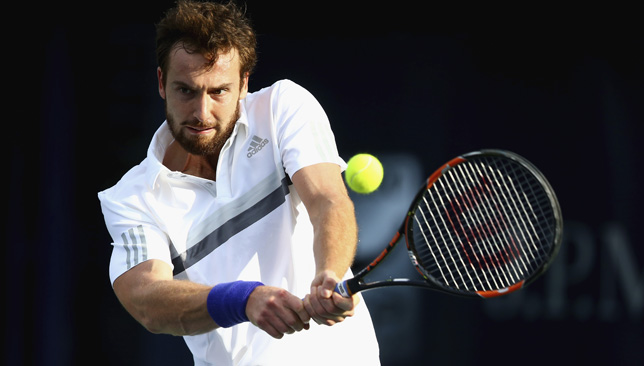
Ernests Gulbis’ run to the fourth round at Roland Garros means he will re-enter the top-60 which could make him eligible for the Olympics, but the Latvian said he has not fulfilled his Davis Cup duties and has no intention of going to the Games.
Gulbis has actually met the requirement of being nominated for at least three Davis Cup ties from 2012 to 2016 but he has not been nominated in 2015 or 2016 (his last tie was in September 2014), which is also a criteria for Olympics eligibility.
The 27-year-old, who advanced to the last 16 in Paris for a third time in his career after Jo-Wilfried Tsonga retired injured from their third round on Saturday, explained his reasons behind snubbing the Olympics, calling it “tennis tourism”.
“That was a choice I made, based on my specific relation also with the Latvian Tennis Federation. And especially also that I really don’t like that in Olympic Games there is no points and no prize money,” said Gulbis, who faces David Goffin in the fourth round in Paris.
“It’s a little bit like tennis tourism, from my side. I don’t know how is the system in bigger federations, but I think that players got a little bit more help from their federations throughout their careers than I did.
“So guys from smaller federations where we didn’t get no help at all throughout our careers, then to go and play… From the other side, it’s always nice to represent your country, but I did represent my country enough. I did it already for last ten years.
“I don’t want to say I’m in the end of my career, but I have maybe four, five years left. And this year can be still a good year. I can maybe still end up in top-20 by end of the year, so I decided to concentrate on that.”
John Isner and Bernard Tomic both mentioned the absence of points at the Olympics as factors in their decision to skip the Games, while Feliciano Lopez said he wanted to focus on his tour goals as he has many points to defend at the US Open.

Saying it straight: Ernests Gulbis.
Gulbis said that in the past, he has had to pay for his own flights to play in Davis Cup and that he had asked his federation to try and secure an Olympics wildcard for him in London 2012 but that they didn’t try hard enough and didn’t really care.
The world No80 has split with his coach of many years Gunter Bresnik, whom he used to share with Dominic Thiem up until before Roland Garros and is now on the lookout for someone new.
Gulbis doesn’t think he will go down the path of hiring a “super coach” the way Novak Djokovic or Milos Raonic have Boris Becker and John McEnroe/Carlos Moya, and detailed what he wants from his next mentor.
“I’m searching for not so much a tactical coach but more of a technical coach who sees – because I’m the kind of player who has problems of maintaining his game and maintaining his shots clean,” said Gulbis.
“These are things that I need for a coach to see and to be on a daily basis next to me and seeing these small changes what I make or what I don’t make so I can maintain the same level of play throughout the year.
“Because, for example, I’m the kind of player, if I don’t take a racquet in hand for a couple of days, then suddenly I start to hit my forehand differently than I did before. So this is what I need in a coach.
“Tactically, you know, I’m still – I think that my game is pretty uncomfortable for most of the guys. If I serve big, if I hit the ball big, okay, of course I can think about where to direct that ball, but still it’s a big shot.
“So I think that mostly I need to concentrate on my own technique and my own shots to be clean.
“To be honest, I don’t necessarily think that a former player – doesn’t matter how good he is – is necessarily a good coach. I think that a good coach needs to have experience.
“I like that Gunter had a lot of experience, especially in the technical side of the game, because he spent probably one of the most hours on court from all the coaches on tour. He was together with kids, he was together with right-handed players, left-handed players, serve and volley, baseliners, juniors, 16, 18, older players.
“So his range of understanding the game is very big. This is what I liked in his experience.
“If you take a former player, they always look at the game from their perspective. They understand what they did, and not always they give you solutions for fixing your game. So you have to have, as a good coach, I think you have to – if one thing doesn’t work, you have to have a backup plan, not one, two, but many of them.
“This is what I’m searching for in a coach.”